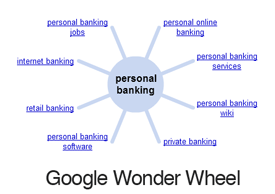Marketing, design, and technical resources for making your digital and print communications more effective.
June 16th, 2010
 As you may be aware from the myriad of past SEO posts we’ve made, the holy grail for getting more customers from Web searches is getting more backlinks (or linkbacks if you prefer). Specifically, multiple high quality link backs from other Websites in the same or related industry to yours. These are the “votes” Google uses to decide how high up on the search results page your site should be listed for a given keyword search. Google itself provides two incredibly powerful tools that have the potential to exponentially improve your return on blog writing time.
As you may be aware from the myriad of past SEO posts we’ve made, the holy grail for getting more customers from Web searches is getting more backlinks (or linkbacks if you prefer). Specifically, multiple high quality link backs from other Websites in the same or related industry to yours. These are the “votes” Google uses to decide how high up on the search results page your site should be listed for a given keyword search. Google itself provides two incredibly powerful tools that have the potential to exponentially improve your return on blog writing time.
The strategy is simple:
- Research current hot topics and searches on Google using Google Trends and Google Wonder Wheel.
- Find a keyword that fits within the realm of a hot topic, applies to your area of knowledge, and appeals to your target customers.
- Post a quality blog focused on the hot topic keywords for your target customers.
Here are the tools:
- Google Trends Find out what search terms and topics are currently high traffic. Self explanatory and intuitive to use: http://www.google.com/trends
- Google Wonder Wheel Expand keyword options and refine a topic to find a keyword topic that fits you and your client base best. To utilize Google Wonder Wheel simply perform a Google search, then expand the “Search Tools” in the left hand column of the result page and click Wonder Wheel.
If you use these tools I would love to hear about your experience.
Tags: Blogging, SEO
Posted in Content Marketing, SEO | Comments Off on The Secret to Writing Blog Posts that Get Noticed
November 30th, 2009
Your business plan needs to rely on demand generation from a source other than organic Internet search engines—a source over which you have more direct control.”
I ran across a great article by Darren Rowse over at ProBlogger entitled, “What to Do When Your Search Rankings Drop.” In it he recounts a time when his site’s traffic dropped a dramatic 70% suddenly and for no apparent reason. He relied on Google to bring in most of his site visitors and some unknown change in their algorithms resulted in this costly (for him) change of fortune. While not the point of his article, this example underscores a principle that we’ve been emphasizing for years—it’s very risky to rely on awareness and demand generation being driven primarily by high search engine result page placement (please note my emphasis of the words rely and primarily).
I’m not suggesting at all that search engine optimization efforts are not important, but rather that your business plan needs to rely on demand generation from a source other than organic Internet search engines—a source over which you have more direct control. The risk of building your business with a single point of failure over which you have no direct control whatsoever is prohibitively risky in almost all business scenarios.
It’s for this reason that we typically advise our clients to build a business plan without consideration for demand generation via search engines (referral marketing is always the most desirable and secure foundation for demand generation) and then go ahead and implement a best practice SEO strategy. If your business plan is solid and your unique value proposition legitimate a by-the-book (Google’s book that is) SEO campaign will generate demand over time; all of which should be treated like “gravy” until significant enough to begin including in your sales forecast. This strategy then mitigates the high-risk of relying on search engines for your business while at the same time taking advantage of the great high ROI opportunity that organic search engine marketing offers.
Tags: Search-Engine-Optimization, SEO, Web-Development-Strategy
Posted in SEO | Comments Off on The Danger of Relying on Search Engines for Your Business
 As you may be aware from the myriad of past SEO posts we’ve made, the holy grail for getting more customers from Web searches is getting more backlinks (or linkbacks if you prefer). Specifically, multiple high quality link backs from other Websites in the same or related industry to yours. These are the “votes” Google uses to decide how high up on the search results page your site should be listed for a given keyword search. Google itself provides two incredibly powerful tools that have the potential to exponentially improve your return on blog writing time.
As you may be aware from the myriad of past SEO posts we’ve made, the holy grail for getting more customers from Web searches is getting more backlinks (or linkbacks if you prefer). Specifically, multiple high quality link backs from other Websites in the same or related industry to yours. These are the “votes” Google uses to decide how high up on the search results page your site should be listed for a given keyword search. Google itself provides two incredibly powerful tools that have the potential to exponentially improve your return on blog writing time.